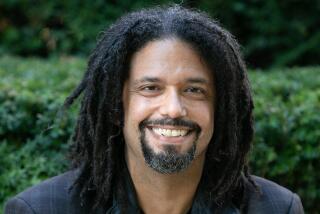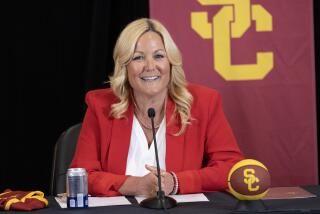Whose home is the Coliseum?
Today, Schmidt and Sanders discuss USC’s proposal to control the Coliseum. Previously, the future of L.A.’s relationship with the NFL after local elections this year and whether it’s worth spending public money on bringing a pro football team to the city. Tomorrow, they’ll conclude their exchange by addressing the rising popularity of professional soccer in Los Angeles.
Walking away from $100 million
By Scott Olin Schmidt
What do the Dodgers, Chargers, Raiders, Rams and Bruins have in common with the USC Trojans? They all are former tenants of the Los Angeles Memorial Coliseum.
For now, there is a new hope that the University of Southern California and the Coliseum Commission will come to terms on a deal to let the Men of Troy stay in their venerable home stadium, but it should never have come to this.
In exchange for a $100-million investment in the stadium and untold millions more dedicated to the surrounding community, USC wanted the Coliseum Commission to grant it a long-term “master lease” for the stadium, establishing the university as the main tenant and operator of the facility. The commission rejected this generous offer, and the university started exploring its options including playing at the Rose Bowl on days other than Jan. 1.
Why on Earth a government body would turn down a $100-million private investment for the public benefit, we may never know. Officially, Los Angeles City Councilman Bernard Parks one of the biggest critics of reaching a deal with USC says that we shouldn’t turn over the keys of a public facility like the Coliseum to a private institution like USC.
That makes for a good sound bite, but Parks’ credibility falls apart when you consider that handing over the Coliseum’s keys to the National Football League has been a pipe dream of his for years. The NFL is simply not coming to the Coliseum. Anyone even casually watching the situation knows it.
I give L.A. Mayor Antonio Villaraigosa credit for having the courage to say as much last November. And the sooner the Coliseum Commission and other local leaders accept that reality, the sooner we can forge a legitimate effort to bring an NFL team to an acceptable Los Angeles venue.
Let’s be clear: The need to update the Coliseum is sobering. Ever since USC President Steven Sample cut off the tap in 2005 and banned alcohol sales at the stadium during football games, USC students and alumni have become acutely aware of the facility’s shortcomings. Like the Rose Bowl, the Coliseum’s parking, concessions and restrooms can accommodate a team that regularly draws two-thirds capacity. Now that even the game against the University of Idaho sells out, the facility’s capabilities are woefully inadequate.
As a cynic, I must fight the urge to believe that this is all about power. If USC had a master lease on the stadium, what role would there be for the Coliseum Commission? Not much but there is one that can meet the expressed concerns of some members of the commission.
First, the Coliseum Commission should gratefully take the university’s money and hold USC to a tight timetable for making improvements to the stadium, much as USC had asked from the commission. In the deal, USC should be committed to keeping the stadium available for public use when it is not being used for its primary purpose. The university should sweeten the pot by committing to a generous community benefit package that would include the hiring of locals, job training, after-school programs for the surrounding neighborhoods, street and traffic improvements and so on.
At a time when the state is suffering from a $14-billion deficit and the city of Los Angeles could face a $340- million shortfall, it would be totally irresponsible for elected leaders to walk away from an offer of millions in private investment for the public benefit.
The commission could make sure that USC lives up to its end of the deal, and if the university is found to be in breach of its contract, the commission could take the back control of the stadium.
The problem with this idea, however, is that it meets everyone’s needs which means it ignores anyone’s secret motivations to, for example, lure an NFL team to the Coliseum, and would never be accepted.
Scott Olin Schmidt covers Pac 10 football for AOL Sports’ FanHouse and politics at Spot-on.com. He is a transportation commissioner for the city of West Hollywood, where he operates his new media outreach consulting firm, RSC Partners.
We’re working on a deal
By Barry A. Sanders
As the newspapers have reported, USC and the Coliseum Commission are engaged in friendly and productive discussions toward a new 47-year lease in which USC will play its home football games at the Coliseum as it always has and the Coliseum Commission will commit to important renovations of the stadium over the next few years. In fact, some of those renovations have already happened, and others are already on order. I hope and expect those negotiations will soon result in a final agreement. It will be good for all of us.
As a Coliseum commissioner, it would be inappropriate for me and it is pointless for all of us to debate other proposals that have been superseded. A guiding principle for any public body dealing with a public asset is that the public must get fair value for its asset. I am happy with the ideas the parties are pursuing now.
Barry A. Sanders is an international corporate lawyer, member of the Coliseum Commission, president of the L.A. City Recreation and Parks Commission, chairman of the Southern California Committee for the Olympic Games and an adjunct professor of communications studies at UCLA.
| | Day 3
More to Read
Go beyond the scoreboard
Get the latest on L.A.'s teams in the daily Sports Report newsletter.
You may occasionally receive promotional content from the Los Angeles Times.










